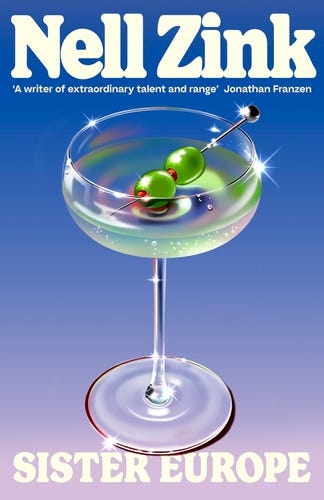Good evening!
I’m baaaaack! Feeling better than ever because while I was away, I submitted my PhD. It came in at 101,270 words and almost killed me.
I hope everyone had a nice Christmas and New Year, and didn’t feel too lost at sea while I took a break. I didn’t read a single book in December and it made me feel very strange. Literally all of my free time was taken up with edits and writing, so December was a bit miserable for me, truth be told. But I had a nice Christmas nonetheless (I still worked on my thesis in the evening…sad).
If you’d like to buy me a coffee, on Ko-Fi, you can do here 🙂
My twitter/X is @jessf_white, my Instagram is @lunchpoems, my Bluesky is @jesswhite
What I’ve been reading this week and what I think about it
The first novel I picked up after my brief hiatus was a proof of Sister Europe by Nell Zink, gifted to me by Penguin. It has an outrageously great cover, which was part of the reason I was attracted to it, although a larger part was that it was close to the top of the towering pile of proofs I have accrued in the past month. Its blurb and premise is equally as compelling: it follows a ragtag group of people over the course of one night, as they take part in a protracted and fairly dull Berlin evening. Among the group are a trans teenager and her conservative father, an ageing publisher whose dates seem to get younger and younger as the years go by, an Arab prince, an heiress to aa fortune and property that is tied into the Nazis, and a misguided cop who is following them, suspecting that something far more nefarious is going on that it actually is. They begin their nights at home, making their way to the Hotel Interconti to a celebration of an Arab author who loosely connects them, which turns out to be a disorganised and disappointing mess. They split off, come back together, split off again, ending their evening at the heiress’ house after an odyssey-like voyage through a Berlin park that commemorates some of the twentieth-century’s political figures and movements.
I liked this book, especially its first half. Zink’s writing has a lot of style, and her aim is to clearly dissect where Europe is now, especially in relation to America and the Arab world. Despite its concern with modernity, much of it feels like a sleek mid-century novel in both its prose and its narrative -- sometimes it was a bit jarring when a character pulled out an iPhone or referenced a common cultural marker. This eased in the second half when it became slightly more philosophical, diving into the inner thoughts of individual characters as they talked to one another, which felt more firmly placed in the now. I also liked a few of the things that the novel had to say, especially in how trans people seem to become a scapegoat for everybody’s concerns and ideas, which largely have nothing to do with the trans people themselves. Zink’s positioning of this as a Western issue between America and Europe was interesting, as she weaves in long held issues that the West have with identity, gender and sexuality that are thought of slightly differently in other parts of the world. There was also a lot of discussions on art and how people interact with it, which I thought was interesting.This is actually a fairly slim book, and it’s quite amazing how many issues were fit into it (another common feature of mid-century literary novels, which are often about everything and nothing).
One thing I will say -- and I’m still working this out so bear with -- is that I did some research on Zink afterwards, largely to find out about her other writing and also What Her Deal Is, and found she had previously lived in Tel Aviv, and has had multiple Israeli partners. This made me think through some of the representations of Arabs in the novel, especially their relationship with Europe. I’m not quite sure what the significance of a granddaughter of a prominent Nazi becoming attracted to an oil-rich Arab Prince is in light of this, but it doesn’t feel completely comfortable. There is a slight discussion about Israel in there, which is kept vague, but as there is so much metaphor tied up in many of the images and motifs of the novel, I would be surprised if this was accidental -- and would probe what it means if it wasn’t.
I’m now reading Cassandra at the Wedding by Dorothy Baker (1962), which I am really enjoying. I;m only about 60 pages in so I’ll update you on it next week. Mainly I am enjoying all the wonderful time I have now -- not only time to do things, but to enjoy them properly as well.
More next week!



